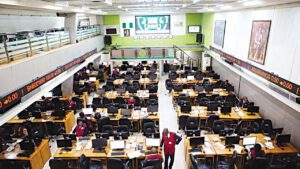

Union Bank initiates strategic recapitalization
By Esther Agbo
Union Bank of Nigeria, under the leadership of its Managing Director and CEO, Yetunde Oni, has announced the commencement of a strategic recapitalisation process. This move comes as part of a broader effort to enhance the bank’s capital base and align with the Central Bank of Nigeria’s (CBN) recent directives aimed at bolstering the financial sector.
In a statement released alongside the bank’s half-year financial results, Oni highlighted the significant progress made in the first half of 2024. Union Bank reported a remarkable 58.19 percent increase in gross earnings, reaching N333 billion, up from N210.5 billion in the same period in 2023. The bank also posted a profit before tax of N79.8 billion, a 20 I percent increase from the previous year’s N66.5 billion.
The recapitalisation effort is in response to a directive from the CBN, which in late March mandated banks to increase their capital base to support President Bola Tinubu’s ambitious $1 trillion economy projection. Specifically, commercial banks with international authorisation are now required to raise their capital to N500 billion, national banks to N200 billion, and regional banks to N50 billion, with a compliance deadline set for April 2026.
“As we move forward, our focus remains on building a controlled, compliant, and profitable organisation. We are committed to maintaining strong governance frameworks, ensuring regulatory compliance, and driving sustainable profitability.
“These pillars will not only fortify our financial stability but also position us to capitalise on emerging opportunities in the market. I am confident that with our continued focus on these priorities, we will sustain our positive momentum and deliver long-term value to our stakeholders.
“At the beginning of the year, our top priority was to keep the momentum going with a strong focus on stability following the intervention of the Central Bank of Nigeria. We also continued with the planned strategic priorities, which are centred around scaling our digital play, driving hypergrowth in target sectors, optimising our wholesale bank structure, aggressively ensuring recoveries of past-due obligations, and orchestrating a robust ecosystem play through existing and new partnerships.
“So far, we are seeing the direct impact of our strategy on our financial performance. We achieved a substantial increase in gross earnings by 58 percent to N333bn compared to N210.5bn in H1 2023. Net Operating Income after Impairments increased by 32 percent to N143.6bn from N108.5bn in H1 2023, attributed to enhanced interest income, fees, commissions, and margin expansion. Similarly, we achieved a profit before tax of N79.8bn, representing 20 per cent growth compared to N66.5bn in H1 2023,” she stated.
Oni emphasised that the recapitalisation is not merely a regulatory requirement but a strategic move to strengthen Union Bank’s financial stability and prepare it for emerging opportunities in the market.
The CBN’s involvement with Union Bank earlier this year, which included the dissolution of the board and the appointment of new executive leadership, marked a significant turning point for the institution. Despite these changes, Union Bank has maintained a strong performance trajectory, as evidenced by its latest financial results.
The bank’s Acting Chief Financial Officer, Oluwagbenga Adeoye, also commented on the challenges faced in the first half of the year, including inflationary pressures and exchange rate volatility. Despite these hurdles, Union Bank’s cost-to-income ratio remains strong, and its loan book has grown by 24 per cent, signalling cautious but steady growth.
“Nevertheless, we were not entirely insulated from these shocks, as non-interest income reduced marginally in H1 2024 by three per cent to N108.3bn from N112.1bn in H1 2023 due to foreign exchange revaluation losses. Operating expenses increased by 52 per cent to N63.8bn against N42bn in H1 2023, majorly due to the high inflationary environment, increased power costs, and increased non-discretionary regulatory costs.
“Notwithstanding, our cost-to-income ratio remains below 50 percent at 44 percent compared to 39 percent recorded in H1 2023 on the back of implementing planned cost-efficiency initiatives. “The bank continued to grow its loan book cautiously, with gross loans increasing by 24 percent to N1.93tn compared to N1.55tn in December 2023, and customer deposits grew marginally by one percent to N2.36tn from N2.34tn in December 2023, reflecting the impact of socio-economic pressures on our operating environment,” he said.




